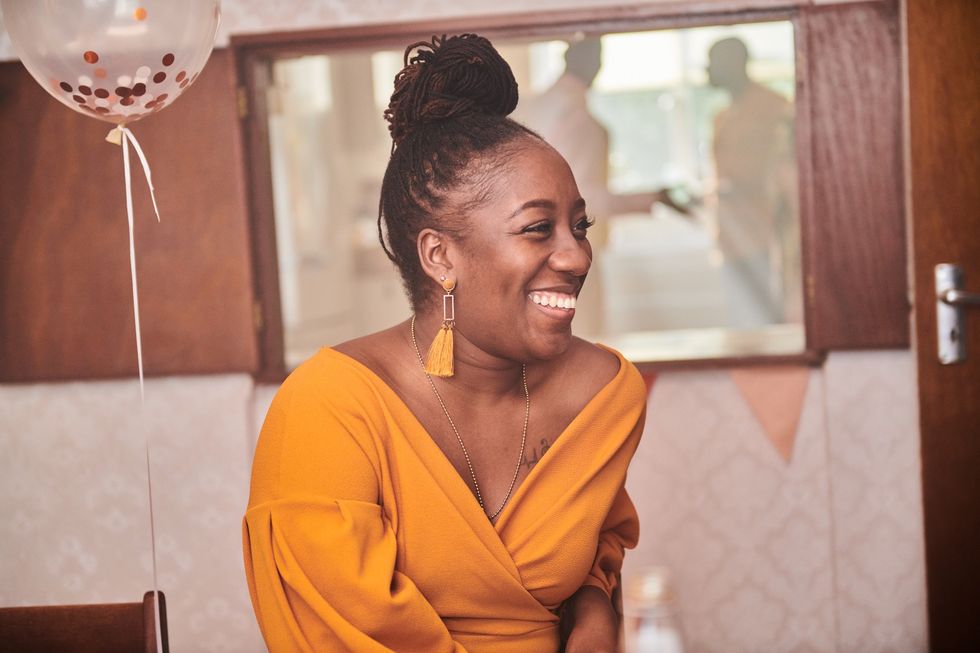The Unhealthy 'Unconscious Contracts' We Make With Our Parents (And How To Break Them)

I’m a quotes kind of girl. Unapologetically so. I think I like them so much because they’re a way of packing in a lot of wisdom and insight without giving an entire speech (or writing an entire article). And if there’s one quote that I know I use at least three times a week, it’s “Adulthood is surviving childhood.”
It’s not a good thing either because, basically, what the quote is saying is a lot of us experience so much trauma as children that many of our adult years are actually spent trying to figure out how to survive it all. In fact, I recently read a Guardian article entitled, “Survivors of childhood trauma often grow up believing they are unworthy,” which had a line in it that summarizes a lot of why I do what I do for a living: “Jane now understands that she was conditioned as a child to see toxic relationships as almost normal.” I’m here to reprogram a lot of counterproductive stuff that a lot of us don’t realize we are doing…as best as I possibly can.
And yes, believe it or not, a part of the reason why we get into then tolerate then endure the oftentimes pure suffering of unhealthy relationships with other people — personal and professional, romantic, platonic and familial — is due to something known as unconscious contracts. Boy, when I first learned about unconscious contracts and what they entail, it was like I had a new way of helping to free up so many people from their hamster wheels of dysfunction with other individuals.
Okay, but I’m getting a little ahead of myself. If you already feel drawn to or even triggered by the intro of this article alone, please set aside some time tonight or this weekend to dive into what it means to sign an unconscious contract, how it typically ends up working against you, and what you can do to change it ASAP.
What Is an Unconscious Contract?

Getty Images
I like giving credit where credit's due, and when it comes to the entire concept of unconscious contracts, one of my instructors taught it to me. She said she learned it from a neuroscience educator by the name of Sarah Peyton.
The gist of an "unconscious contract" is it's an agreement that you made, oftentimes in order to get through living with your toxic parent (or parents), that ended up being an unhealthy habit or approach to dealing with other people as you grow and develop into adulthood (you can watch an intro video about it here that is pretty damn enlightening if I do say so myself).
According to Sarah and her findings, a lot of our full dependence on our parents (especially our mother since she's usually the primary caregiver), as far as communication goes, happens around four months of age and, without us even noticing it, we find ourselves figuring out what needs to be done in order to get along with them — even if it's ultimately to our detriment.
An article that dives deeper into all of this is "When Relationships Fall Apart: Conscious and Unconscious Agreements in Relationship." The authors speak on the fact that a conscious contract is an agreement where both parties know the commitment that they are getting into, while an unconscious contract is usually unspoken, although what transpires is one person decides to suppress their thoughts, feelings, and needs in order to make another person happy (or it at least makes getting along with them easier to do).
Now I'll already tell you that if you read this and thought, "Isn't that just compromising?" you just revealed that you are someone who definitely needs to continue on with this piece because, no, suppression is not compromise; suppression is you denying a part of who you are in order to keep the peace — or avoid abuse — and there is nothing compromising about that. It is destructive and definitely the kind of "unconscious contract" that you need to break…immediately if you can.
Before I break down how to do that, let's go a bit deeper into all of this.
How an Unconscious Contract Affected Your Childhood Development

Getty Images
Last fall, Newsweek published an article entitled "Why Adult Children Are Cutting Off Their Parents More Than Ever." Now for the record, no parent is perfect, and since some people like to throw around words like "toxic" as if they are confetti, let's look into some signs that you definitely had a toxic parent as a child/teenager — and that you may still have one now:
- They didn't respect your privacy/boundaries
- They pressured you to agree with them even when you didn't
- They were harder on you than they were on other children (especially outside of the home)
- They found a way to make everything about them
- They wouldn't let you ask questions for clarity (and/or they lashed out when you did)
- They were controlling
- They didn't shield you from trauma (and they oftentimes caused it)
- They used religion to justify their toxic behavior
- They used you as a makeshift therapist/counselor (told you too much information)
- They were verbally and/or emotionally and/or physically and/or sexually abusive
- They were emotionally unpredictable
- They weren't supportive (or you felt like they were competing with you)
- They kept you walking on eggshells
- They deflected from taking accountability for their mistakes (or poor choices)
- They either used guilt or withheld love in order to get their way
If any of this resonated with you, yes, on some level, you are a survivor of a toxic parent — again, not an imperfect parent; more like someone who put you in a position where you dealt with some level of trauma on a consistent basis. And because it's a parent's job to help you to become a holistically healthy individual, when the opposite happens, it can stifle you on some level.
For instance, I grew up with parents who didn't know how to respect a boundary or take accountability if it hit them square in the face. I don't even have the time to get into how deep it all went. For now, I'll just give one example of how it played out in my adult years — recent ones. One parent was so toxic that they really should be in prison. Because they're not, they had the nerve to email me acting like they were doing me some favor by leaving me alone…like I had told them to do for almost two decades now, that they still had moments when they would disrespect the boundary. And where did they get my contact information? From the other parent. WILD. Not you out here enabling my abuser.
Boundaries are limits, and limits (when they are not used to weaponize or manipulate) are put into place to keep us safe. People who don't respect your boundaries are unsafe individuals.
When I think about how my boundaries were constantly being dishonored as I was growing up affected me all through those years. One way is I didn't know how to set healthy boundaries with other people. As a result, I had some of the most toxic female friendships known to man (no joke). Another result is I had a tendency to be controlling to certain other people too. Control is what was modeled to me (suffocatingly so), all the while being told that it was love, and so… that's what I thought it was.
I had written an "unconscious contract" with my parents that allowed them to railroad my space, my body, and my feelings. My needs were basically the "rent" that I had to pay to live in their home and have my basic material needs met. And so, I thought that's what relationships looked like — that I had to go above and beyond while overlooking what I deserved in order to keep people around, OR I had to control the narrative in some way as a way of expressing my "love" to them. And I lived just like this for many years.
How an Unconscious Contract Affects Your Relationships Now

Getty Images
Before the end of the year is out, I'll be finishing my third book. One of the things that it's going to touch on is just how emotionally abusive one dynamic with a certain guy was. I'll give you an example. One time, I helped him put on an event. I got him the venue for free. I made the programs. I set up the slideshow. I ran the slideshow. He didn't pay me a dime. Because the venue was about an hour away and we left unbelievably late (in separate cars), I asked him if he would stay on the phone with me because I was sleepy. He yelled at me, told me that I needed to find someone else, and hung up. And the next day, what did I do? I texted him to make sure that he was okay. AMAZING. He never apologized, even when I brought it up. Instead, he deflected and justified his behavior. Also AMAZING.
In hindsight, I know this is the fallout from unconscious contracts that I had "signed" with my parents, several of them. Something in me thought that if I just loved that man enough, eventually, he would stop mistreating me. Yet, I know him well enough to know that he has his own unconscious contracts that need to be broken, so while I was over-giving, he was over-hustling. He also was being ungrateful and narcissistic (and narcissism is also oftentimes the result of a traumatic childhood; it's a cryptic way of protecting oneself). Yeah, because I still had some "live contracts" going on, folks were able to get away with all kinds of stuff.
I'll give you another example. I have a girlfriend who keeps picking materialistic and shallow women as friends (check out "7 Signs Your Friendship...Actually Isn't One"). Her mother was exactly that way. It's wearing her out now because she feels like all she has in common with her circle is shopping and, inconsequentially, debt. Yet, until I introduced the concept of unconscious contracts to her, she didn't realize that all she really had in common with her mom — and the only time her mom ever really spent quality time with her — was when money was involved (including her mom feeling entitled to her money in present time).
Again, adulthood is surviving childhood. So, take a moment and think about the list that I provided as it relates to whether or not you had a toxic parent. Where the points apply, ponder what your adult relationships look like these days. Where are there patterns? Where are there mirror reflections of the relationship that you had with your mother and/or father and/or caregiver? Where do you see the same kind of unhealthiness…even now?
When we're children, we are innocent and a blank slate. We rely on our parents to show us how we are to see ourselves, along with how we are to live out our lives. So yeah, without some serious inner work (and oftentimes therapy), the contracts that we became a part of as children will continue in our adult world — that is, until we break them.
What Can You Do to Break an Unconscious Contact

Getty Images
I already know — this is some pretty heavy stuff (which is why I implied at the beginning that it's not exactly lunchtime reading). Yet you know how the saying goes, knowledge is power, and if you could relate to any of this, how freeing is it to get to some of the roots, to receive confirmation that you're not crazy (sis, you're not) and then be provided with tips on how to get up out of these, what seem like lifelong binding agreements, that are not serving you (and never really were)?
Okay, so now that you know what an unconscious contract is, how you found yourself being a part of one, and how much damage they ended up doing, what can be done to break the contract? Good question.
A PDF that I was given (via Sarah Peyton's site) is what my instructor shared with me. I have edited it a bit so that it can make a bit more sense (if this is your first time hearing about unconscious contracts):
Step 1. Determine what the contract initially was.
“I (your name), ________________ , solemnly swear to you (parent/caregiver),___________________
to (whatever the self-defeating behavior was) ________________________ in order to protect you/honor you/survive, no matter the cost to myself. “
Step 2. Was the vow heard? (In order to feel validated in this exercise, you should get someone you trust to serve as a representative to act as the parent/caregiver you are speaking to.)
“Parent or caregiver, did you hear this vow?”
“Parent or caregiver, do you like this vow?”
Step 3. Can the vow be released? If so, release it.
If yes, the representative says, “I release you from this vow and I revoke this contract.”
(If the vow cannot be released, like your parent lives with you and they are still doing the behavior, you may want to seek therapy to figure out what boundaries need to be set up, especially if your parent tends to go full gaslight or full denial whenever you bring trauma or their past mistakes up.)
Step 4. Create a blessing to break the unconscious contract.
The representative says, “And instead of this vow, I give you my blessing to...(create the blessing)”
In a perfect world, you could talk to your parent about all of this, and no representative would be needed — yet honestly if that were the case and your parent was truly self-aware, apologetic, and willing to make amends, they would probably approach you first about the harm that they caused. That's why a representative can be helpful. They are symbolic, and while you may never get this kind of release from your actual parent, the validation and affirmation that comes from the exercise may be enough for you to fast-track your way to healing and to feel stronger in saying "no," setting limits and requiring that your needs be met from your parents — and to offer up consequences when that is not the case.
This is an exercise that can reduce fear and stagnation so that you can start to get on with how to have healthier relationships with others moving forward.
The Benefits of Ending Unconscious Contracts…and Creating New Ones

Getty Images
A wise man once said, "My word is my bond." That said, to tell you the truth, the only way that breaking an unconscious contract is going to work is if there is integrity behind your words. You need to identify them, vocally acknowledge them, and have your representative acknowledge you/them. You need to receive the blessing, and then, what I recommend is setting up a new contract — this time between you and yourself.
For instance, if your childhood unconscious contract was all about you walking on eggshells, the new contract needs to say something along the lines of, "I will no longer put my own feelings and needs aside whenever I feel bullied or even dismissed. My voice matters, especially when it comes to what directly affects me, so I will speak up when necessary." Whew. Can you see how empowering that is?
It can't be said enough that there is plenty of data out here to support the fact that at the age we are traumatized, oftentimes we remain right there emotionally until we heal — and healing can include breaking our unconscious contracts. Only, in my opinion, it's not enough to break one…you need to then replace it with another; otherwise, you could find yourself slipping back into what's familiar…even if you know it's not what's better/best for you.
___
This really is something that I could go on for days about because it’s the kind of topic that is so freeing once people are able to apply it in their own world. For now, I’ll just say that contracts are binding agreements. Yet, the good thing about unconscious contracts is you can let yourself off of the hook, knowing that you, as an adult, now have the space to live as you wish. You don’t have to “go along to get along” in the midst of super crazy, super counterproductive, super toxic ways.
You can write new contracts — ones that will strengthen you, validate you, and give you the kind of life that YOU want to live. Not the one that your toxic parent(s) made you think you had to settle for.
So, what unconscious contracts are you going to break today?
What new ones are you going to put into motion?
There’s no time like the present to start fully living YOUR life.
Amen? Hallelujah. For real.
Let’s make things inbox official! Sign up for the xoNecole newsletter for daily love, wellness, career, and exclusive content delivered straight to your inbox.
Featured image by Vladimir Vladimirov/Getty Images
This Is How To Keep 'Holiday Season Stress' From Infecting Your Relationship
Hmph. Maybe it’s just me, but it seems like there is something really weird happening in the fall season air (because winter doesn’t officially begin until December 21) that cuddle season is in full swing while break-up season is as well. In fact, did you know that break-ups are so popular during the holiday season that December 11 is deemed Break-Up Day?
The reasons why relationships shift around this time vary; however, I did both roll my eyes and chuckle when I read that a very popular one is because it’s an easy way to get out of getting one’s significant other a Christmas present. SMDH.
Anyway, I personally think that the less shallow folks out here may contemplate calling things “quits” or they at least distance themselves a bit from their partner (and what I’m referring to is serious relationships) due to all of the stress and strain that oftentimes comes with the holidays whether it be financial, familial, due to their tight schedules or something else.
Listen, I would hate for you and your man to miss the fun and happiness of experiencing this time of year, all because you are so overwhelmed or irritated that you can’t really enjoy it. That’s why I have a few practical tips for how to avoid allowing the typical holiday season stress from INFECTING your relationship.
Manage Your Expectations
 Giphy
GiphyUnmanaged expectations. If there is a main reason why the holiday season tends to be so stress-filled for so many people, I’d bet good money that this is the cause. And when you’re in a long-term relationship, expectations can manifest themselves in all sorts of cryptic and/or unexpected ways. You might have relatives who assume that you are going to be with them for Thanksgiving or Christmas when you have other plans in mind. You might be thinking that you are going to spend one amount for presents while your man is thinking something totally different. When it comes to scheduling, your signals may be crossed.
And you know what? To all of these scenarios, this is where clear and consistent communication come in. Don’t assume anything. Don’t dictate anything either. From now until New Year’s, mutually decide to check in once a week, just to make sure that you are both on the same page as it relates to the holidays and what you both are thinking will come along with it. The less blindsided you both feel, the less stressed out you will be. Trust me on this.
Set (and Keep) a Budget
 Giphy
GiphyOkay, so I read that last year, 36 percent of Americans incurred some type of holiday-related debt. Hmph. Last year, there was still some sense of normalcy in this country, chile, so I can only imagine what finances are gonna look like over the next several weeks. That said, since I don’t know a lot of people who don’t find being broke stressful, make sure that you and your bae set a budget and then stick to it this year — no ifs, ands or buts.
Because really, y’all — it doesn’t make sense to deplete savings and/or max out credit cards for a few days of giggles only to be damn near losing your mind because you don’t know how to make ends meet come Dr. Martin Luther King, Jr. Day.
And by the way, this tip doesn’t just speak to things like food and gifts; I also mean travel. If it doesn’t make a ton of sense (or cents) to be all over the place this year — DON’T BE.
Keep Matthew 5:37 at the Forefront
 Giphy
GiphyIf off the top of your head, you don’t know what Matthew 5:37 says, no worries, here ya go: “But let your ‘Yes’ be ‘Yes,’ and your ‘No,’ ‘No.’ For whatever is more than these is from the evil one.” That verse right there? Oh, it’s a boundaries lifesaver! I say that because do you see “maybe” or “I’ll think about it” in there? Nope. LOL. It says that you should tell people “yes” or “no” and leave it at that — and that complements Anne Lamott’s quote, “’No’ is a complete sentence” impeccably well. Yeah, you’ve got to remember that anything beyond a yes or no to a request is privileged information; you don’t owe anyone details or an explanation.
Besides, if you are really honest with yourself, when someone asks you something and you give a “Umm, let me think about it” kind of reply, more times than not, you already know what your answer is going to be — so why not let you both off of the hook? Give your response. Commit to that. And let everyone (including yourself) get on with their lives and schedules.
I promise you that when it comes to those holiday parties, you are pissing more folks off by not RSVP’ing or doing so and not showing up than just saying, “Thank you but not this year” off the rip.
Remember That Your Personal Space Is Privilege Not a Right
 Giphy
GiphyA friend of mine recently bought a new house and invited me over to come see it. He’s a single man with no children, so as I was taking in all of the space that he had, especially as I walked through his finished basement, I joked about relatives coming to live with him. “Hell no” and “absolutely not” were pretty much his immediate responses as he went on to say that some folks even had the nerve to be offended when he told them that he had no intentions on taking DNA in.
Ain’t it wild how people think that your stuff is their right? And yes, that brings me to my next point. Your home is your sanctuary space. If you want to host folks this year — cool. If not, ALSO COOL. Please don’t let folks (family included) guilt you into how they want you to act or even into what they would do if the shoe was on the other foot. You are not them — and as one of my favorite quotes states, “If two people were exactly alike, one of them would be unnecessary.” (A man by the name Larry Dixon said that.)
Hell, my friends? They know that I am good for sending them random things that they need or even want all throughout the year. Coming over to hang out at my pace, though. Uh-uh. Chalk it up to being a card-carrying member of the ambivert club yet I like keeping my living space personal — and I sleep like a baby, each and every night, for feeling that way.
Always remember that your space, your time, your resources, your energy and shoot, yourself period (including your relationship), are all things that are your own. You get to choose how, when and why you want to share them. The holiday season is certainly no exception.
Cultivate Some “You Two Only” Traditions
 Giphy
GiphyIt’s not uncommon for some couples to hit me up after the holiday season to “detox.” Sometimes it’s due to the financial drama (and sometimes trauma) that they experienced. Sometimes it’s because they allowed their relatives (especially in-laws) to get more into their personal business than they should’ve. More than anything, though, it tends to be because they didn’t get enough quality time together and so ended up feeling “disconnected.”
Please don’t let that happen. Listen, I’m not even a holidays kind of woman and yet, I will absolutely sit myself down with some hot chocolate and chocolate chip cookies to enjoy a Hallmark holiday film or two. Aside from the fact that most of them are lighthearted and sweet, I also like that they usually focus on couples loving on each other amidst all of the holiday beauty and ambiance — which is something that all couples should set aside some time to do.
Maybe it’s a vacation. Maybe it’s a staycation. Or maybe it’s my personal favorite, A SEXCATION. Whether it’s for a few days, the weekend or even overnight — don’t you let the holidays go by without setting aside time for you and your man to celebrate one another. Don’t you dare (check out “Are You Ready To Have Some Very Merry 'Christmas Sex'?”).
GET. SOME. REST.
 Giphy
GiphyI once read that 8 out of 10 people get stressed out over the holidays and 3 out of 10 lose sleep during to it — and when you’re stress-filled and sleep-deprived, that can absolutely lead to hypersensitivity, making mountains out of molehills and even not being in the mood for sex.
Your relationship can’t afford to go through any of this, so definitely make sure to prioritize rest. I don’t care how unrealistic it might seem during this time, sleep should never be seen as a luxury; it will always and forever be a great necessity.
That said, try to get no less than six hours of shut-eye in (check out “6 Fascinating Ways Sex And Sleep Definitely Go Hand In Hand”) and even ask your bae to take a nap with you sometimes (check out “Wanna Have Some Next-Level Sex? Take A Nap, Sis.”). Not only will sleep help to restore your mind, body and spirit but, when it’s with your partner, it’s an act of intimacy that can make you both feel super connected, even in the midst of what might feel like chaos.
___
Holiday season stress is real. Still, never give it the permission or power to throw your relationship off. Put you and your man first and let the holidays be what they are gonna be, chile.
Let’s make things inbox official! Sign up for the xoNecole newsletter for love, wellness, career, and exclusive content delivered straight to your inbox.
Featured image by Shutterstock
How To Avoid Being An Emotionally Impulsive Spender This Holiday Season
Geeze. Can you believe that we are just a few days out from another Christmas? Yeah, me neither. In fact, because I’m not a holidays person myself (check out “So, What If You Don't Observe Holidays?”), it wasn’t until one of my clients was venting about how stressed out she was due to all of the holiday season procrastinating that she had been doing that I realized just how fast December is actually flying by.
If, like her, you’re feeling frazzled because, although you told yourself last year that you weren’t going to wait until the last minute to “handle your business,” you ended up doing exactly that, fret not. I’ve got 10 tips that can keep you from making emotionally-triggered decisions as far as your financial expenses are concerned. Merry Christmas. #wink
1. Create a Budget. Stick to It.
 Giphy
GiphyBudgets, boy. I recently read that one of the reasons why they don’t work for a lot of people is because many folks don’t have a clue about how much money they spend on a monthly basis to begin with. SMDH. That said, at the end of the day, it’s important to remember that a budget is simply setting boundaries/limits on your spending — and being intentional about moving in this fashion is always a wise move; especially when it comes to this time of the year…especially being that it’s typical for half of all Americans to take on some type of holiday season debt with 17 percent needing six (or more) months to pay it off.
Know what can prevent this kind of financial chaos? A SPENDING BUDGET. Tips for how to create one of your own this year can be found here.
2. Never Shop When You’re Stressed or Pressed
 Giphy
GiphyYou know how they say that it’s not a good idea to go grocery shopping when you’re hungry? Although the holiday season can be a stressful time, avoid shopping for gifts (or décor or food for recipes) when you are feeling stressed out or pressed for time. More times than not, that cultivates anxiety which could cause you to either purchase things that you don’t really want or to spend money that you don’t really have (P.S. If you’re relying on credit cards, that qualifies as money that you don’t really have. Just sayin’).
3. Don’t Keep Up with the Joneses
 Giphy
GiphyKnow something else that can stress you out: trying to keep up with the Joneses. And y’all, now that we have social media, the reality is that envy is at an all-time high. That’s because it can be really easy to watch holiday engagements, holiday trips and folks bragging about the things that they’ve received in times past, only for you to find yourself wishing that you were them — or putting pressure on yourself and those in your world to keep up.
Listen, it is King Solomon who once said, “So are the ways of everyone who is greedy for gain; It takes away the life of its owners” (Proverbs 1:19 — NKJV) and “A sound heart is life to the body, but envy is rottenness to the bones” (Proverbs 14:30 — NKJV) and he’s considered to be the wisest man who ever lived (during his time — I Kings 4:30). Yeah, both of these verses are a spiritual reminder that whatever you are planning to do or give, do it out of the goodness of your heart — not so that you can low-key “outdo” the next guy.
4. No Need to “Tit-for-Tat”
 Giphy
GiphyThis one might be a bit controversial yet I’m totally okay with that. I don’t care what the occasion is, no one is OWED a present. A gift is a voluntary token of one’s appreciation or affection. That said, if you decide to give someone a present this year, don’t automatically expect something in return. If you get something, cool. If not, if you were giving for the right reasons, it really shouldn’t matter (RIGHT?). On the flip side, if someone decides to get you something and you don’t have something to offer in return, also cool.
Other than going to someone’s home for a holiday dinner or party, for anyone to feel like they should have something in hand because someone else does…that’s not giving, that’s competing — and that absolutely should not be the spirit that you are in (or around) during this time of year.
Again, a gift is not an obligatory thing. If you’ve always thought otherwise, it’s time to do some serious reprogramming.
5. Avoid the Pressure to Buy for Lots of Adults
 Giphy
GiphyLast month, Newsweek published an article that said it’s wise to not spend a ton of money purchasing gifts for adults. A financial expert in the piece said that it’s best to buy for kids because, more times than not, you’re going to get adults something that they already have a lot of, they don’t really need or they’re not going to use (beyond maybe regifting) anyway.
If you’re not feeling that insight, my take would be to exchange names and set a price cap for the grown folks. I say that because, I don’t think that people ever outgrow wanting something over Christmas. It’s just that the over-the-top energy should be reserved for the kiddies — and even then, the “4-gift rule” (want, need, read, experience) is probably your best bet for them…financially and otherwise.
6. Go for Thoughtful over Expensive
 Giphy
GiphyIt’s kind of wild how much close-to-torture folks send themselves through to purchase gifts that, a good 6-8 months now, most folks aren’t even going to remember. That’s why it’s also a good idea to purpose in your mind to get something thoughtful over expensive.
Honestly, that’s a big part of the reason why Etsy continues to be a go-to for gifts (for every occasion) for me. It’s because you can oftentimes get things customized/personalized which ends up meaning so much more to people than something that you bought at a generic department store that might have a high price tag yet still lacks in sentimentality and deep meaning.
7. Use Coupons and Promo Codes
 Giphy
GiphyCoupons (and promo codes) are a slippery slope in the sense that…they remind me of when I used to go overboard while thrift store shopping. I say that because, just because I might find several bomb dresses for under $20, what am I going to do with 50 of ‘em (over time)? It’s just as much of a waste of money as buying couture if neither option gets much use.
And that’s kind of the thing about coupons and promo codes. Some people end up overspending because they rationalize that so long as there are discounts attached, it’s all good. At the same time, this doesn’t mean that you should forego coupons and promo codes altogether. The key is to put together your shopping list (and budget) and then use discounts specifically for those items. If you do this, you could save well over $1,000 annually (at least, depending on what you decide to buy).
8. Avoid Add-Ons
 Giphy
GiphyYeah. Dodge add-on expenses. Add-ons like what? The first thing that comes to my mind is a warranty. What’s the chance that someone is actually going to need that? Another example is paying for things to be “professionally” gift wrapped. Chile, throw that stuff in a gift bag with some tissue paper and go on about your day. All good.
9. Rethink Gift Cards
 Giphy
GiphyIf there is any time of the year when there is a noticeable hike in gift card purchases, now would be it. And although they are a convenient approach to gift giving, at the same time, many come with hidden fees, the full amount oftentimes goes unused (which ends up being a waste of money) and they do come with expiration dates that are oftentimes forgotten.
So, if you’re someone who likes to wait until the last minute to do your holiday shopping, resist the urge to impulsively pick up a handful of gift cards. Unless it’s to a place that you know someone is going to use within the next few months, they could end up in somebody’s kitchen drawer for the next couple of years. And what a waste that would be.
10. They’ll Get It When They Do. And That’s Okay.

=
GiphyOne more. Although it is super thoughtful and proactive to get people their gifts in time for whatever occasion you purchased them for, if trying to reach that goal is going to require paying for rush shipping that is damn near as high as the price of gift or spending a lot of gas money that you don’t have at the moment to drive miles and miles away — take the pressure off to spend a ton of cash just to make sure that something arrives at December 25. Listen, through doing business with Etsy, I have learned that through this administration, there are all sorts of tariff issues going on and the USPS is slower than ever too, so paying more may not guarantee much.
The hack? Send a message that something special is coming…soon enough. The thought really is what counts (more times than not); plus, it builds anticipation of something good coming, even if it’s after all of the Christmas Day hoopla. And no one (with sense) is going to have a problem with that.
Now don’t you feel better? Happy Holiday Shopping, sis.
Let’s make things inbox official! Sign up for the xoNecole newsletter for love, wellness, career, and exclusive content delivered straight to your inbox.
Featured image by Shutterstock









